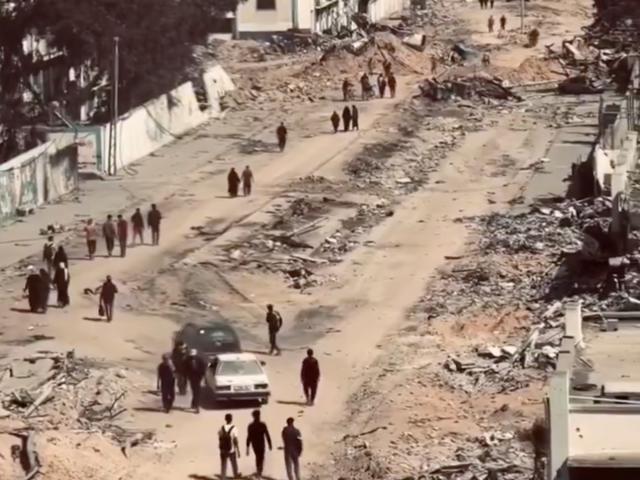In a significant shift in the ongoing conflict in southern Gaza, residents of Khan Younis have started to return to their homes following the unexpected withdrawal of Israeli forces from the area. This development comes after a prolonged period of intense military engagement that has left the cityscape heavily scarred, with extensive damage to buildings and infrastructure, and the pervasive smell of decay underscoring the recent violence.
The Israeli military's strategic pullback, coinciding with the six-month anniversary of the conflict, has sparked widespread speculation and analysis among commentators within Israel. The move, which was not previously announced, has led some to interpret it as a potential pivot in the conflict's intensity. Despite the withdrawal, a limited Israeli military presence remains, aimed at securing the divided sections of Gaza.
Israel radio Reshet B discussing developments in Gaza and hostage talks in Gaza and noting that the withdrawal of forces from Khan Younis is basically a kind of ceasefire without it being official.
— Seth Frantzman (@sfrantzman) April 8, 2024
Basically Hamas got a lot of what it wanted without a hostage deal.…
High-ranking officials within the Israeli military and government have maintained that this action does not signal an end to the military operations or a delay in the anticipated offensive on Rafah. This stance comes amidst mixed messages regarding the status of ceasefire negotiations in Cairo, where some reports indicated notable advancements, including reports that the pullout is an undeclared ceasefire meant to give Hamas a large concession in hopes of getting hostages home.
"The destruction is unreal."
— DW News (@dwnews) April 8, 2024
After the Israeli military announced the withdrawal of most of its ground forces from southern Gaza, many Palestinians returned to Khan Younis city only to find their homes destroyed. pic.twitter.com/jbfIsg6kaV
Visual reports from Khan Younis reveal a landscape of devastation, with significant damage to the city's infrastructure, including Al Nasser, the main hospital which Israel had shown in videos to be a major base for terror groups Hamas and Islamic Jihad. Residents, some of whom had cheered on October 7th as dead Israelis were being paraded around Khan Younis and then in an ironic twist, fled their homes during the height of the conflict, returned to find their neighborhoods unrecognizable and largely uninhabitable. The city center, identified as a significant operational base for Hamas, featuring tunnels, weapon caches, and command centers, has been particularly affected.
While Israeli officials describe the military's redeployment as a preparatory step for future operations, this explanation has been met with skepticism. Critics argue that there appears to be little preparation for a large-scale evacuation in Rafah, contrary to claims made to international partners. This situation has fueled debate within Israel, with some viewing the government's approach as an attempt to manage the conflict's intensity for political purposes. Some chatter coming out of Egypt claims that the withdrawal was a precondition of Hamas's in the negotiations, which, if true could lead to a hostage deal.
There is something going on on the hostage front.
— No Ceasefire until #BringThemAllHome (@EBluemountain1) April 8, 2024
Egypt presented Israel's withdrawal from Khan Younis as meeting part of Hamas' demands.
Negotiations are coming fast and furious even though Hamas denies this.
Coming days are critical#BringThemHome
The Israel Defense Forces' Chief of Staff, Gen. Herzi Halevi, emphasized the ongoing nature of the conflict, highlighting the continued targeting of Hamas operatives and infrastructure. This stance is echoed by members of the Israeli government, though the withdrawal has stirred concerns among some that the approach may lead to concessions without achieving strategic objectives.
Once more, terror group #Hamas is exploiting humanitarian compounds in #Gaza to advance its genocidal objectives. The #IDF reported targeting three Hamas rocket launchers positioned near humanitarian shelters in southern Gaza’s Khan Younis, which were utilized in attacks on… pic.twitter.com/ObZptWLIMy
— StandWithUs (@StandWithUs) April 8, 2024
The evolving situation in Gaza, marked by the Israeli withdrawal and the uncertain outcomes of ceasefire discussions, reflects the complex dynamics of the conflict and the challenges faced by all parties involved in navigating its resolution.


